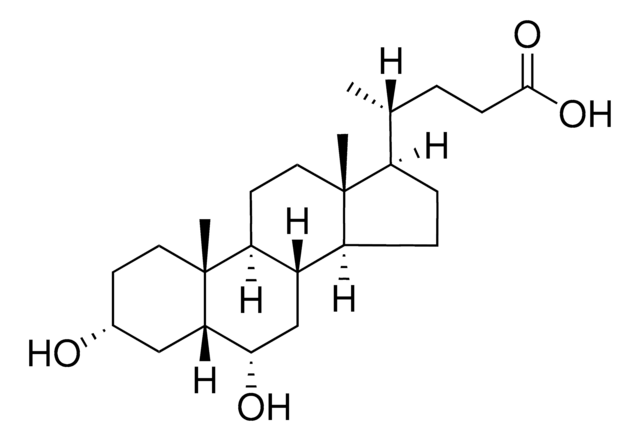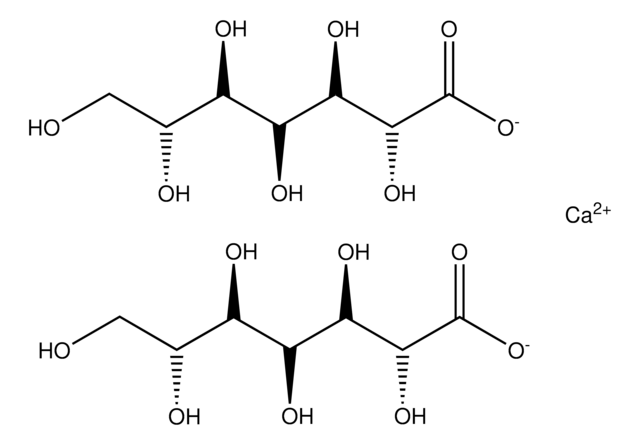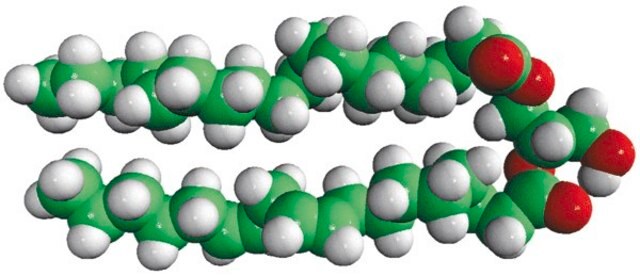790147P
Avanti
16:0-23:2 Diyne PE
1-palmitoyl-2-(10,12-tricosadiynoyl)-sn-glycero-3-phosphoethanolamine, powder
Synonym(s):
PTPE
Sign Into View Organizational & Contract Pricing
All Photos(1)
About This Item
Empirical Formula (Hill Notation):
C44H80NO8P
CAS Number:
Molecular Weight:
782.08
UNSPSC Code:
12352211
NACRES:
NA.25
Recommended Products
Assay
>99% (TLC)
form
powder
packaging
pkg of 2 × 100 mg (790147P-200mg)
pkg of 1 × 25 mg (790147P-25mg)
manufacturer/tradename
Avanti Research™ - A Croda Brand 790147P
shipped in
dry ice
storage temp.
−20°C
General description
16:0-23:2 Diyne PE or 1-palmitoyl-2-(10,12-tricosadiynoyl)-sn-glycero-3-phosphoethanolamine is an ultraviolet (UV)-polymerizable phospholipid.
Application
16:0-23:2 Diyne PE or 1-palmitoyl-2-(10,12-tricosadiynoyl)-sn-glycero-3-phosphoethanolamine has been used in the preparation of:
- 2-dimensional phospholipid and copolymer nanomembranes
- planar polymerizable phospholipid membranes for reconstitution of protein ion channels formed by the bacterial toxins
- mixed monolayers at the air-water interface on a Langmuir-Blodgett (LB) trough
Packaging
5 mL Amber Glass Screw Cap Vial (790147P-200mg)
5 mL Amber Glass Screw Cap Vial (790147P-25mg)
Legal Information
Avanti Research is a trademark of Avanti Polar Lipids, LLC
Storage Class Code
11 - Combustible Solids
Certificates of Analysis (COA)
Search for Certificates of Analysis (COA) by entering the products Lot/Batch Number. Lot and Batch Numbers can be found on a product’s label following the words ‘Lot’ or ‘Batch’.
Already Own This Product?
Find documentation for the products that you have recently purchased in the Document Library.
Susan M Daly et al.
Langmuir : the ACS journal of surfaces and colloids, 22(3), 1215-1222 (2006-01-25)
We formed monolayers and black lipid membranes (BLMs) of photopolymerizable lipids mixed with the channel-forming protein gramicidin A to evaluate their miscibility and the potential for improved stability of the BLM scaffold through polymerization. Analyses of surface pressure vs area
Ziqiang Guan
Journal of chromatography. B, Analytical technologies in the biomedical and life sciences, 877(26), 2814-2821 (2009-03-24)
Discovery and structural elucidation of novel brain lipids hold great promise in revealing new lipid functions in the brain and in understanding the biochemical mechanisms underlying brain physiology and pathology. The revived interests in searching for novel brain lipids have
Devanand K Shenoy et al.
Nano letters, 5(6), 1181-1185 (2005-06-10)
We demonstrate that polymerizable planar membranes permit reconstitution of protein ion channels formed by the bacterial toxins Staphylococcus aureus alpha-hemolysin (alphaHL) and Bacillus anthracis protective antigen 63. The alphaHL channel remained functional even after membrane polymerization. Surface pressure measurements suggest
Hiromichi Sakai et al.
The Journal of biological chemistry, 289(38), 26607-26617 (2014-08-13)
Decreased expression of diacylglycerol (DG) kinase (DGK) δ in skeletal muscles is closely related to the pathogenesis of type 2 diabetes. To identify DG species that are phosphorylated by DGKδ in response to high glucose stimulation, we investigated high glucose-dependent
Yuuna Kamiya et al.
Biochemistry and biophysics reports, 7, 361-366 (2016-07-20)
A variety of diacylglycerol (DG) molecular species are produced in stimulated cells. Conventional (α, βII and γ) and novel (δ, ε, η and θ) protein kinase C (PKC) isoforms are known to be activated by DG. However, a comprehensive analysis
Our team of scientists has experience in all areas of research including Life Science, Material Science, Chemical Synthesis, Chromatography, Analytical and many others.
Contact Technical Service![23:2 Diyne PE [DC(8,9)PE] 1,2-bis(10,12-tricosadiynoyl)-sn-glycero-3-phosphoethanolamine, powder](/deepweb/assets/sigmaaldrich/product/images/228/422/4e95f75c-14fa-4117-a383-2eff73fa927f/640/4e95f75c-14fa-4117-a383-2eff73fa927f.jpg)

![23:2 Diyne PC [DC(8,9)PC] Avanti Research™ - A Croda Brand 870016P, powder](/deepweb/assets/sigmaaldrich/product/structures/284/664/e58cb25d-e85d-46ca-80f2-870cae07c7f5/640/e58cb25d-e85d-46ca-80f2-870cae07c7f5.png)






